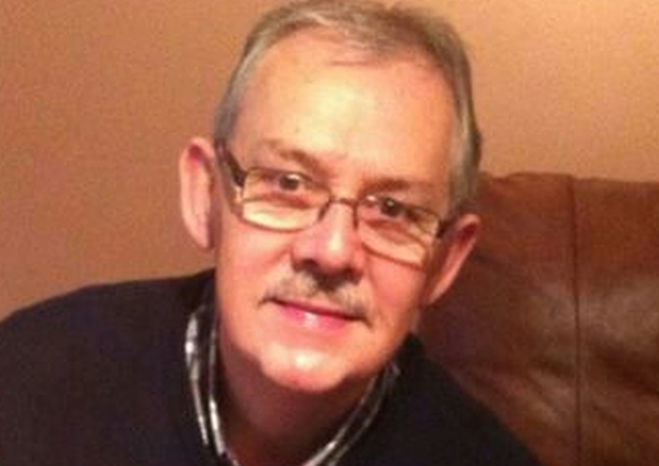By Niall McCracken
NORTHERN Ireland’s Attorney General, John Larkin QC, has directed that an inquest must be held into the death of a West Belfast man warning that “any further delay could have an adverse effect on public safety”.
Last week The Detail reported on the case of 61-year-old Alfie Hannaway who had been on the blood thinning drug warfarin after a major heart operation at the Royal Victoria Hospital. He died of a brain haemorrhage after being re-admitted to the hospital three weeks after his surgery in September 2013.
His death was not initially investigated by the Coroners’ Service for Northern Ireland but was re-opened following a campaign by the Hannaway family.
A decision by Northern Ireland’s Senior Coroner, John Leckey, on whether or not to hold an inquest had been pending. However, The Detail can today reveal that the Attorney General has now intervened in the matter and directed an inquest after receiving information on Mr Hannaway’s case from his family.
In a letter dated 1 August 2014 sent to the Hannaway’s solicitor, the Attorney General said the family’s correspondence had highlighted “a number concerns” regarding their father’s aftercare treatment following his operation at the Royal Victoria Hospital in August 2013. The letter was received by the family’s solicitor yesterday.
It stated: “Having considered all the material that has been supplied to me including medical notes and records, a copy of the Signifcant Event Audit (SEA) report and correspondence from Belfast Health and Social Care Trust, I have decided that this is a suitable case in which I should exercise my power to direct a coroner to hold an inquest and so I direct.
“As I understand it the Senior Coroner is currently investigating this matter with a view to making a decision as to whether or not to hold an inquest.
“It is my view that an inquest investigation should have been commenced immediately following the death in September 2013 and that as any further delay could have an adverse effect on public safety I am issuing this direction to allow the Senior Coroner to commence the inquest process as soon as is reasonable.”
Reacting to the Attorney General’s letter the Hannaway family told The Detail:
“We would like to express our sincere thanks to the Attorney General, John Larkin QC, for granting an inquest into the untimely death of Alfie Hannaway, husband, daddy and granda.
“We were disappointed that the coroner could not come to this conclusion sooner, adding to our tragic and unbearable loss of our daddy. We have been relentlessly pursuing daddy’s case for the last 10 months. Without the support of our wider family circle and Padraig O’Muirigh Solicitors we wouldn’t have reached this stage.”
We contacted the Belfast Trust to request a statement regarding the latest development in Mr Hannaway’s case but it said it was “not in a position to discuss any individual’s treatment or care”.
In a letter to the family last month the Belfast Trust apologised and said: “There were serious deficiencies in the communication regarding your father’s surgery and discharge, and therefore his warfarin management following discharge.”
Last week a story by The Detail looked at why Mr Hannaway’s death had not initially been earmarked for further investigation by the Coroners’ Service for Northern Ireland.
Coroners are independent judicial officers who deal with matters relating to deaths which may require further investigation to establish the cause of death. If there is evidence that a death was not from natural causes, then a coroner may decide to hold an inquest.
Following Mr Hannaway’s death on 21 September 2013 his family expressed concerns about his medication.
As a result of the family’s persistence, the Belfast Trust carried out a Serious Event Audit (SEA) report that highlighted concerns and made recommendations for learning regarding the management of Mr Hannaway’s warfarin medication.
On request of the family, the Belfast Trust sent the SEA report to the coroners’ service for further consideration at the end of March 2014.
In May 2014 the coroners’ service re-opened Mr Hannaway’s case and until this week a decision had been pending on whether or not an inquest should take place.
In a previous statement to The Detail the coroners’ service said it had been awaiting hospital statements from the Belfast Trust.
However the delay in the coroner’s decision prompted the Hannaway family to contact the Attorney General’s office in June 2014. They also forwarded on all the documentation relevant to their father’s case.
Under section 14 (1) of the Coroners Act (Northern Ireland) 1959 the Attorney General can direct a coroner to hold an inquest into a death if he considers it “advisable to do so”.
When the coroner receives a referral from the Attorney General there is a statutory requirement to hold an inquest.
In concluding his recent letter to the Hannaway family’s solicitor the Attorney General said:
“It is my view that a new inquest could usefully inquire into the aftercare received by Mr Hannaway following his operation and those processes surrounding the administration of warfarin in this case. This will serve not only to enable Mr Hannaway’s family to understand how he died but will also serve the general interest of public safety."
In a statement to The Detail a spokesperson for the coroners’ service said: “I can confirm that the Coroners’ Service Northern Ireland have received a letter from the Attorney General exercising his powers under section 14 of the Coroners Act (NI) 1959. You should note that the case is currently under investigation by the coroner. The coroner is awaiting hospital statements at present.”
Reacting to the Attorney General’s letter, the Hannaway family’s solicitor, Padraig Ó Muirigh, said the family was now hopeful that lessons can be learned from their tragic loss.
He said: "The decision of the Attorney General is welcomed by the Hannaway family, especially in light of the delay by the coroner to make a decision on whether to hold an inquest into the death of their loved one.
“An inquest will provide an opportunity for public scrutiny of the relevant medical practices and make findings on the deficiencies of the care of Mr Hannaway and its impact on his subsequent death.”
 By
By

